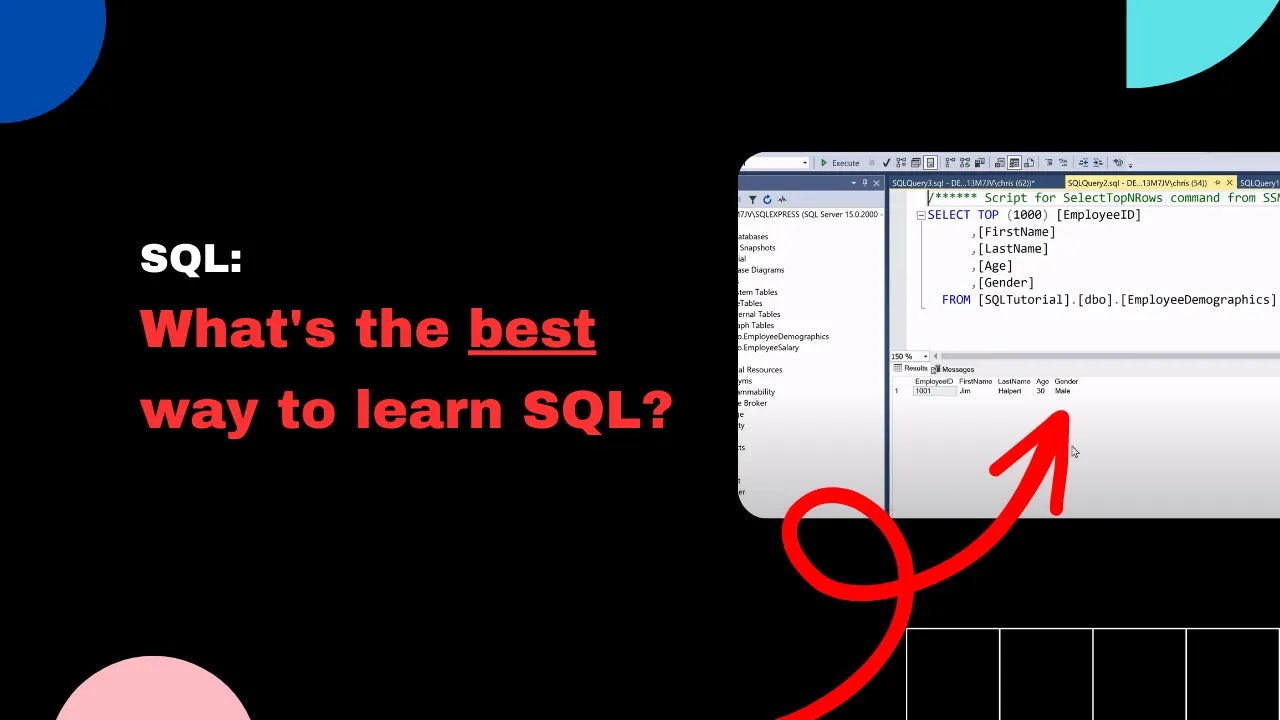6 Best Ways To Learn SQL (Most of them are FREE)
Are you trying to learn SQL?
There are so many resources on the Internet. You are probably wondering... what's the best way to learn SQL? (And easiest!)
In this article, I'll share the 6 best ways to learn SQL.
Best Ways to Learn SQL
The best ways to learn SQL are:
1.Work On a Personal Project
In my opinion, the best way to learn SQL is to work on a real project.
What are you trying to build? What interests you?
For example, a database that stores data about...
- your favorite sport,
- movies you watched,
- your small business needs,
- your family budget?
Being faced with a problem you need to solve is the best way to learn SQL.
At the end of your journey, you'll both learn a valuable skill, and your project will be useful!
How to get started with SQL?
Here are a few tips to help you get started with learning SQL:
- Install a database management system (DBMS): MySQL, PostgreSQL, or MS SQL on your computer.
- If you don't have an existing dataset, download a sample database, such as the Wide Word Importers database.
- Install a SQL IDE to query the database.
- Start with simple queries. Learn how to use SELECT statements to retrieve data from a table.
- Practice using different clauses, such as WHERE, GROUP BY, and JOIN.
- Experiment with creating tables, views, and stored procedures to understand the different components of a database.
2. Take an Interactive SQL Tutorial
Interactive courses let you learn by doing. My favorite interactive website is SQLBolt.
SQLBolt is a free collection of interactive SQL lessons. Each lesson contains a concise, one-page, explanation of a SQL topic. At the end of each one, there's an interactive prompt that lets you run SQL code.
You'll learn topics such as SELECT queries, filtering, sorting, multi-table queries with JOINs, inserting, updating, and deleting rows, as well as creating, altering, and dropping tables.
3. Take an Online SQL Course
Paid online SQL courses are a comprehensive way to learn SQL.
They are a great option if you need a lot of structure in your learning. You get what you pay for, so it's worth investing in a quality course.
Here's my favorite:
15 Days of SQL: The Complete SQL Masterclass 2023
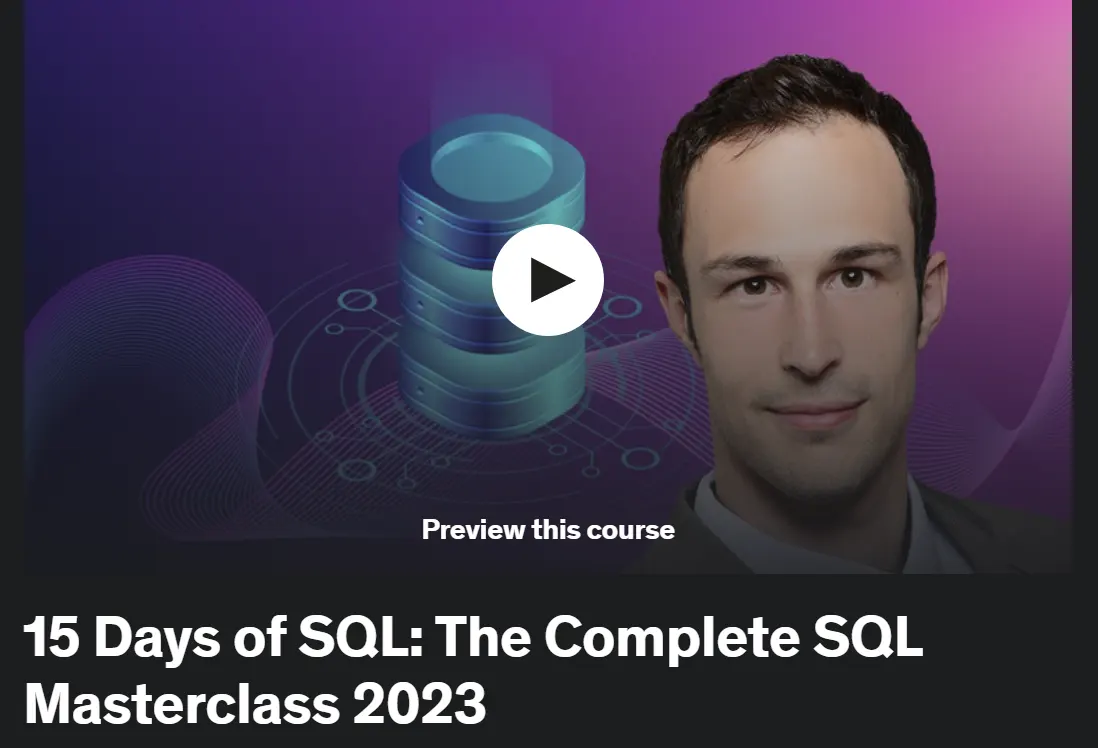
The 15 Days of SQL: The Complete SQL Masterclass 2023 course by Nikolai Schuler on Udemy covers everything from SQL basics to advanced topics like stored procedures, grouping sets, transactions, and indexes.
Over 15 days, you will work on real-life projects to master SQL and be able to use it professionally. The course includes two complex real-life databases that you will work with.
The course has a rating of 4.7 out of 5 with 1,549 ratings and over 10k students enrolled.
4. Watch YouTube Tutorials
YouTube is packed with resources for learning SQL. Not all of them are great, so you need to be careful which one to pick.
The best channel for SQL beginners is Alex The Analyst.
Alex is an experienced Data Analyst. He gives great examples on not only how to learn the SQL syntax, but also how to apply it in the real world.
5. Read SQL Books
If you like reading, grab a SQL book.
Sams Teach Yourself SQL in 10 Minutes
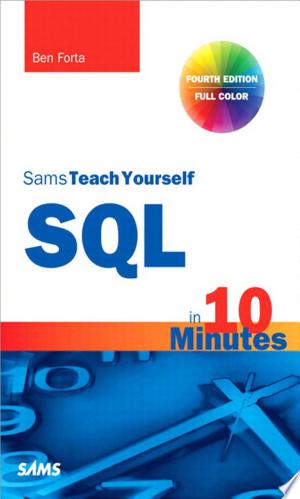
Teach Yourself SQL in 10 Minutes is my favorite SQL book for beginners. It's a comprehensive guide to learning SQL.
The book covers the basics of the language, such as working with data retrieval and filtering, as well as more complex topics like joins and subqueries. The book also teaches how to use aggregate functions, create and alter tables, and work with views and stored procedures.
The author has revised it many times, so the examples in it are up to date and work with the latest SQL syntax.
6. Obtain SQL Certifications
Sometimes you need a goal when learning new things. Obtaining a SQL certification is a valuable goal that can prove your knowledge of SQL.
Picking the best SQL course depends on the flavor of SQL you choose - Microsoft, MySQL, Oracle, or PostgreSQL.
Microsoft Certified: Azure Data Fundamentals
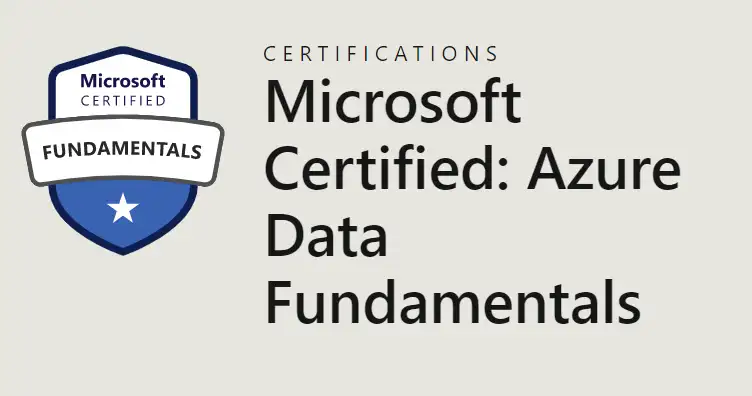
The Microsoft Certified: Azure Data Fundamentals certification is designed to provide a foundational understanding of core data concepts and their implementation using Azure data services.
The DP-900 exam covers data concepts, workloads, and analytics-related topics.
In the core data concepts section, you will learn about batch and streaming data, relational data characteristics, and data analytics core concepts like visualization, reporting, basic chart types, analytics techniques, and ETL processing.
You will also learn how to work with relational and non-relational data on Azure, including identifying the right data offering, describing data structures, Azure data services, and query techniques for data using SQL language.
Finally, you will need to describe an analytics workload on Azure, including data warehousing, data ingestion and processing, and data visualization in Microsoft Power BI.
How long does it take to learn SQL?
To develop a basic understanding of SQL that would be sufficient for an entry-level job, you need around 2-4 weeks. The process involves following online tutorials, practicing with sample databases, and building your simple queries.
SQL is a language with a lot of depth, and even experienced professionals continue to learn and improve their skills over time. You can start with SQL relatively quickly, but becoming a true expert takes years of practice.
Josip Miskovic is a software developer at Americaneagle.com. Josip has 10+ years in experience in developing web applications, mobile apps, and games.
Read more posts →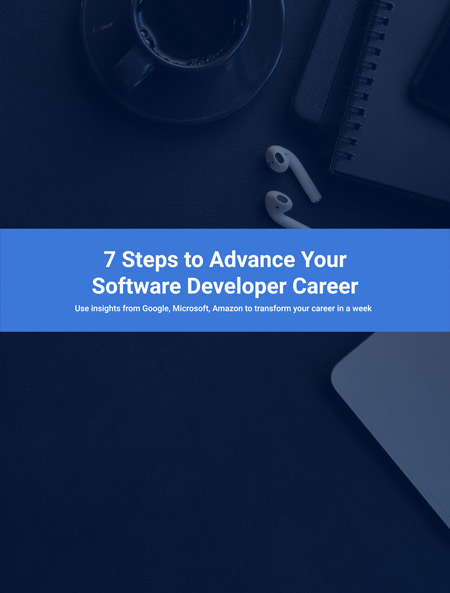
I've used these principles to increase my earnings by 63% in two years. So can you.
Dive into my 7 actionable steps to elevate your career.
